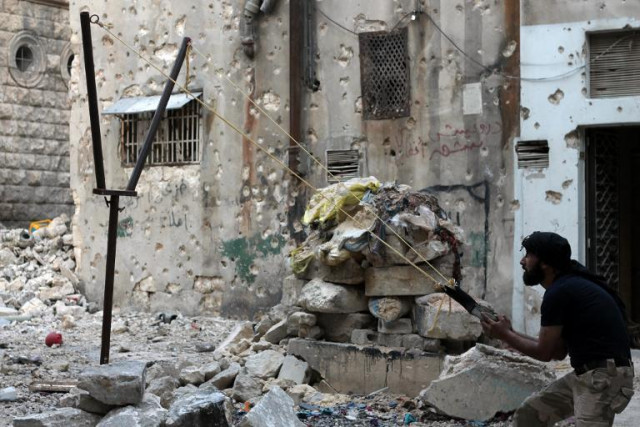Syria says peace talks possible as rebels kill top officer
The peace process will get a renewed push from US Secretary of State John Kerry.

An opposition fighter aims with a catapult towards regime forces in the northern embattled Syrian city of Aleppo. PHOTO: AFP
Syrian state television announced on Thursday that Major General Jamaa Jamma "was martyred while carrying out his national duties to defend Syria and its people and pursuing terrorists in Deir Ezzor".
Jamaa was in charge of military intelligence in the eastern province, where rebel forums said he was killed in clashes with radical fighters.
The peace process will get a renewed push from US Secretary of State John Kerry, who will travel to London next week for a meeting of the core countries making up the Friends of Syria, the State Department said.
Kerry said "we are trying to move the process forward. I'll have meetings next Tuesday in London with the support group of the (Syrian) opposition".
"We're working towards this Geneva conference, not that we know what the outcome is," he said in an US radio interview.
In Moscow, Syrian Deputy Prime Minister Qadri Jamil said a proposed peace conference in Geneva could take place November 23-24, saying "we are closer than ever to holding the Geneva 2".
Both the Russian foreign ministry and the United Nations said the date of the conference would be decided by UN chief Ban Ki-moon.
"When it is time for an announcement, the secretary general will make one," UN spokesman Martin Nesirky told reporters in New York.
"And I would remind you and everybody that it is the secretary general who will be convening the conference and it will be the secretary general who invites the different parties to attend."
Russia and Western nations have been pushing since May for new talks between the Syrian regime and rebels on a negotiated solution to the conflict, which has killed more than 115,000 people since March 2011.
The Syrian opposition is divided on attending the conference, and President Bashar alAssad's regime says his removal from office will not be on the table at any talks.
The National Coalition, the opposition umbrella group, said it would hold internal discussions next week culminating in a vote on whether to attend the gathering.
But Jamil said there was "no alternative" to the peace conference and that the absence of parts of the Syrian opposition would not affect the timing or format.
The international community has renewed its push for the Geneva conference following a deal under which Syria will turn over its chemical arsenal for destruction.
The agreement, enshrined in a UN Security Council resolution, staved off threatened US military action against Assad's regime after an August 21 sarin attack outside Damascus that killed hundreds.
Under the resolution, a team from the United Nations and the Organisation for the Prohibition of Chemical Weapons has been in Syria overseeing the destruction of its chemical arms.
On Thursday, the OPCW, which was awarded the Nobel Peace Prize last week, said nearly half its inspections of the arsenal were complete.
"We have done nearly 50 percent of the verification work of the facilities that have been declared to us," Malik Ellahi, a political advisor on Syria for OPCW, told journalists in The Hague.
Despite the progress, Ellahi said security remained a concern for the unprecedented mission in war-torn Syria, with mortar and car bomb attacks taking place in areas near to the inspectors' Damascus hotel.
"There have been a number of incidents over the last few days which gives some cause for concern," Ellahi said.
So far Damascus has won praise for its cooperation with the inspectors, but the United Nations has stressed that key deadlines be met.
These include verifying Syria's disclosed chemical weapons, identifying key equipment, destroying production facilities and starting the destruction of Category 3 chemical weapons by November 1.
Inspectors have until June 30 next year to complete the destruction of Syria's chemical arsenal.
The United Nations said Thursday that a Canadian staffer held by a radical group in Syria for eight months had been freed in good health and without a ransom being paid.
Carl Campeau, a legal advisor with the UN force that monitors a ceasefire in the Golan Heights between Syria and Israel, was abducted on February 17 as he drove in a Damascus suburb, UN officials said.
The Syrian government turned him over to the United Nations in the capital, state television said.



















COMMENTS
Comments are moderated and generally will be posted if they are on-topic and not abusive.
For more information, please see our Comments FAQ